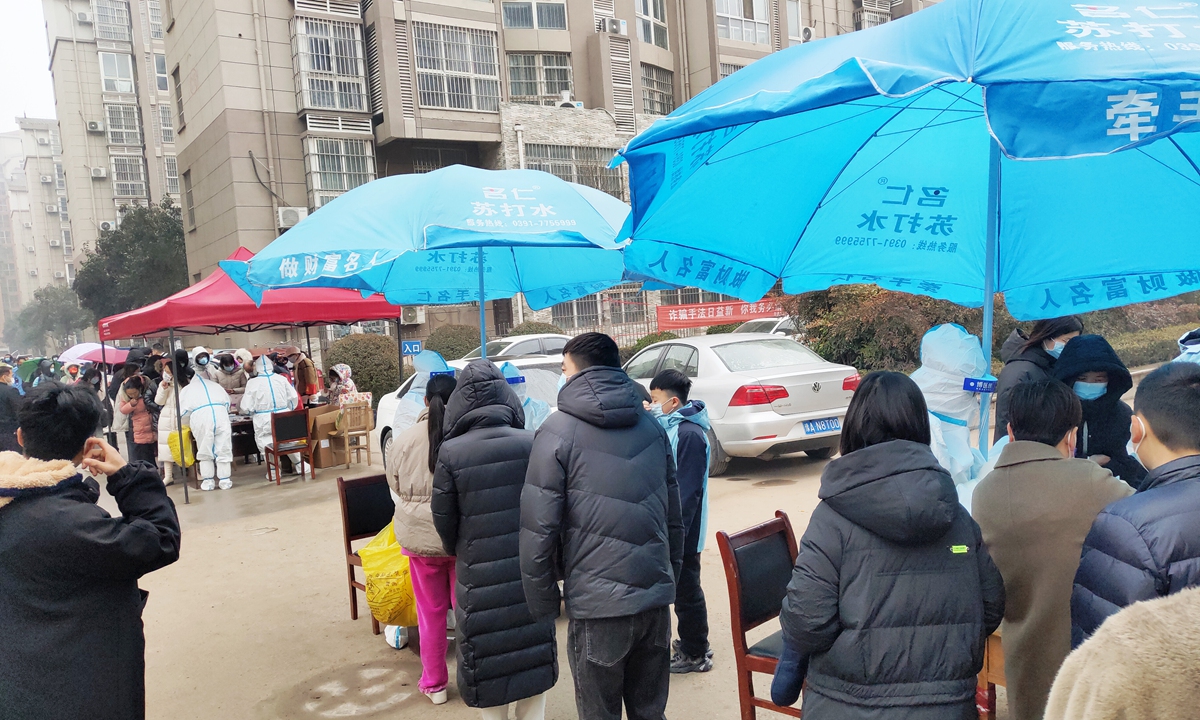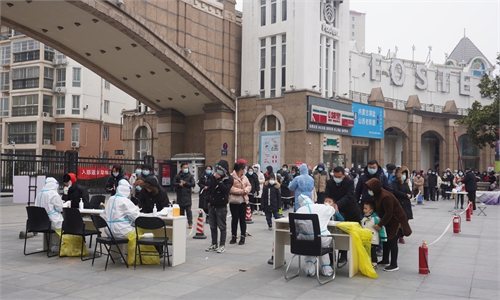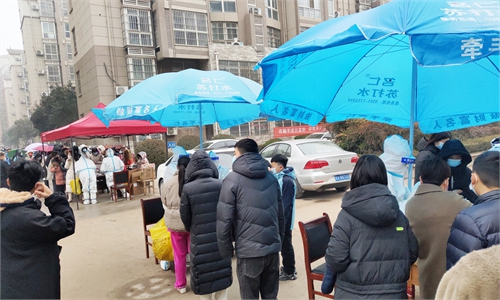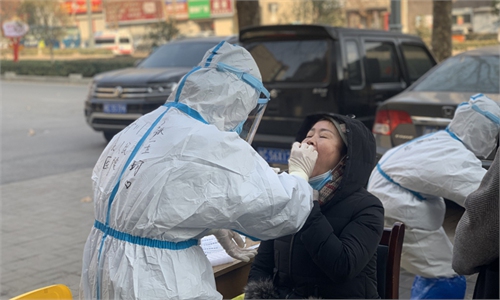Henan virus fight complicated by dual variants, loophole
Outbreak may come from multiple sources: experts

Residents of Anyang, Central China's Henan Province stand in line with their umbrellas in light rain for a second round of nucleic acid testing on January 10, 2022. Photo: VCG
Central China's Henan Province is at the critical juncture of battling dual challenges posed by both the Delta and Omicron variants that have affected seven regions with possibly two or even more sources of infection. But it is a good sign to see that newly confirmed cases in Henan cities were detected only in epidemic-controlled zones, which means the risk of a larger-scale outbreak is low, experts said.
Although generally, the Henan government's behavior in handling this round of the epidemic has been applauded by locals, incidents including a manager from a medical testing institute being detained on suspicion of spreading COVID-19, and irresponsible officials and residents breaking anti-epidemic rules, have shadowed the complicated outbreak in the province.
The local government of Anyang, a city in Henan, which has been battling Omicron since one infected patient is a student who arrived from Tianjin, punished 11 officials and 61 governmental agencies as of Wednesday, for their irresponsibility in the fight against the virus.
An area manager from the Zhengzhou KingMed Clinical Laboratory Center, the largest third-party medical testing institute in the region, surnamed Zhang, was detained by local police on Monday on suspicion of criminal offenses related to causing the spread of COVID-19.
The police notice showed Zhang violated the rules of prevention and treatment of infectious diseases, thereby spreading the coronavirus.
After the incident, some netizens claimed that Zhang was detained because he "spread the virus on purpose," or because he "lost the test sample" and thus falsified the data of tests.
KingMed issued another statement on Wednesday night, clarifying that those claims are rumors.
A Beijing-based immunologist, who required anonymity, told the Global Times that nucleic acid testing is the most important link during the battle against COVID-19, so if something goes wrong in this process, the consequences will be "disastrous."
The immunologist said that the outbreak in Henan is "more complicated" than those in Xi'an and Tianjin. He attributed the complexity to the fact that two variants, Delta and Omicron, have emerged in the province's flare-ups, noting that this indicates at least two or even more sources were behind Henan's outbreak.
Henan on Tuesday registered 118 new confirmed domestic cases. Seven regions in the province have been rattled by COVID-19 so far.
In the face of a complicated epidemic resurgence, the Global Times found the lockdown areas in the province were further extended on Wednesday. In Huaxian, a county administered by Anyang, about 130 kilometers from Zhengzhou and 70 kilometers from Anyang, a lockdown started on Wednesday, after Anyang locked down the city.
But it is a good sign to see newly confirmed cases in Anyang and Zhengzhou being discovered only in epidemic-controlled zones, which means the risk of a larger-scale outbreak is low, some experts reached by the Global Times said.
Han Heng, a professor at the School of Politics and Public Administration at Zhengzhou University, told the Global Times on Wednesday that for Henan - a very populous province that has had floods and rounds of outbreaks, and especially Zhengzhou, a megacity with over 10 million people - the Henan government's handling of these latest outbreaks has been applauded by locals.
Compared with Xi'an in Northwest China's Shaanxi Province, where the local government's response to the outbreak has been widely criticized, Henan has done better in the epidemic fight. Locals in epidemic-controlled zones were provided with enough help and daily necessities, and communities were managed differently based on risk, but Han admitted that some small loopholes may exist, hoping that society will show some tolerance.
Henan swiftly started epidemiological investigations as the provincial government requires a team to finish all epidemiological study of a patient within 24 hours and confine people who may pose a risk immediately.
The province also has a team offering psychological counseling for residents, COVID-19 patients and their relatives, and medical staffers provide them with necessary psychological help and support.
A forecast system developed by Lanzhou University showed that outbreaks in Zhengzhou and Xuchang are likely to be controlled around January 20.



